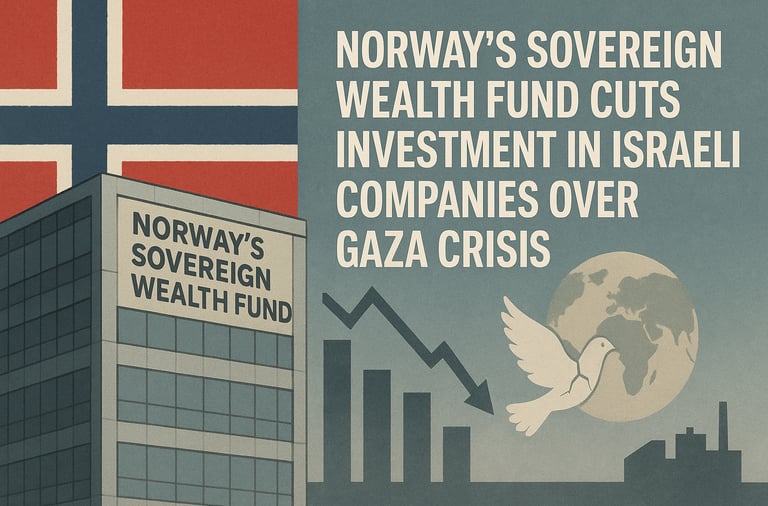Norway’s Sovereign Wealth Fund Cuts Investment in Israeli Companies Over Gaza Crisis
Norway’s sovereign wealth fund reduces investments in Israeli firms linked to the Gaza conflict, emphasizing ethical finance and corporate responsibility amid rising humanitarian concerns.
Raja Awais Ali
8/12/20252 min read


Norway’s Sovereign Wealth Fund Cuts Investment in Israeli Companies Over Gaza Crisis
Norway’s sovereign wealth fund, one of the largest and most influential investment funds globally, has made a significant decision to reduce its financial exposure to several Israeli companies amid growing concerns about the humanitarian crisis in Gaza. This move, announced in August 2025, reflects a growing trend among institutional investors to prioritize ethical considerations in their portfolios, especially regarding companies linked to conflict zones and human rights issues.
Following a detailed internal review, the fund identified 11 Israeli companies for divestment. Notable among them are Bet Shemesh Engines Ltd., known for servicing military aircraft; Elbit Systems Ltd., a major defense electronics firm involved in manufacturing military technology used in conflict zones; Israel Aerospace Industries, a producer of defense and aerospace equipment; and Rafael Advanced Defense Systems, recognized for missile defense and other military technologies.
These companies are primarily involved in defense, surveillance, and construction sectors connected to military operations in Gaza and the occupied Palestinian territories. Their activities have been linked to violations of international humanitarian standards, prompting ethical concerns.
By reducing investments in these firms, Norway is sending a clear message about the increasing importance of ethical responsibility in global finance. This action underscores the power of economic influence as a tool for promoting human rights and encouraging corporate accountability. Many global investors now evaluate not only financial returns but also the social impact of their investments, marking a significant shift toward conscientious and value-driven investing.
Human rights organizations and advocates have welcomed Norway’s decision, viewing it as an important step toward addressing alleged violations in Gaza. However, Israeli officials have expressed concerns that such divestments may negatively impact legitimate businesses operating within legal frameworks and could harm economic relations.
This development highlights the expanding role of sovereign wealth funds and large institutional investors in shaping international corporate behavior. As custodians of trillions of dollars in assets, these funds face increasing pressure to ensure their investment choices do not contribute to conflict or human rights abuses.
The fund’s decision comes amid escalating violence and a worsening humanitarian situation in Gaza, where millions face shortages of essential supplies and ongoing security threats. Norway’s financial sector response adds a new dimension to international efforts aimed at influencing the conflict’s course and promoting peaceful resolutions through non-military means.
Looking ahead, Norway’s sovereign wealth fund plans to continue scrutinizing its portfolio through an ethical lens, possibly extending divestment measures or other actions to promote corporate responsibility globally. This approach may encourage other investors to follow suit, amplifying the impact of responsible investing as a force for social change.
In conclusion, Norway’s decision to cut investments in Israeli companies amid the Gaza crisis reflects a growing recognition that finance and ethics are intertwined. It signals a powerful shift toward sustainable and accountable investment practices, highlighting how economic tools can be harnessed to support human rights and peacebuilding efforts worldwide.